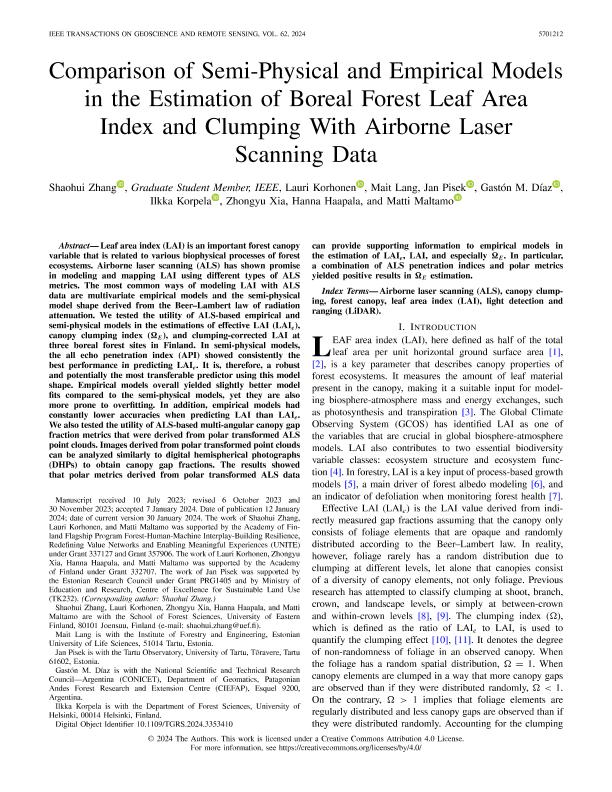Artículo
Comparison of Semi-Physical and Empirical Models in the Estimation of Boreal Forest Leaf Area Index and Clumping with Airborne Laser Scanning Data
Zhang, Shaohui; Korhonen, Lauri; Lang, Mait; Pisek, Jan; Díaz, Gastón Mauro ; Korpela, Ilkka; Xia, Zhongyu; Haapala, Hanna; Maltamo, Matti
; Korpela, Ilkka; Xia, Zhongyu; Haapala, Hanna; Maltamo, Matti
 ; Korpela, Ilkka; Xia, Zhongyu; Haapala, Hanna; Maltamo, Matti
; Korpela, Ilkka; Xia, Zhongyu; Haapala, Hanna; Maltamo, Matti
Fecha de publicación:
01/2024
Editorial:
Institute of Electrical and Electronics Engineers
Revista:
IEEE Transactions on Geoscience and Remote Sensing
ISSN:
1558-0644
Idioma:
Inglés
Tipo de recurso:
Artículo publicado
Clasificación temática:
Resumen
Leaf area index (LAI) is an important forest canopy variable that is related to various biophysical processes of forest ecosystems. Airborne laser scanning (ALS) has shown promise in modeling and mapping LAI using different types of ALS metrics. The most common ways of modeling LAI with ALS data are multivariate empirical models and the semi-physical model shape derived from the Beer–Lambert law of radiation attenuation. We tested the utility of ALS-based empirical and semi-physical models in the estimations of effective LAI (LAIe), canopy clumping index (Omega_E), and clumping-corrected LAI at three boreal forest sites in Finland. In semi-physical models, the all echo penetration index (API) showed consistently the best performance in predicting LAIe. It is, therefore, a robust and potentially the most transferable predictor using this model shape. Empirical models overall yielded slightly better model fits compared to the semi-physical models, yet they are also more prone to overfitting. In addition, empirical models had constantly lower accuracies when predicting LAI than LAIe. We also tested the utility of ALS-based multi-angular canopy gap fraction metrics that were derived from polar transformed ALS point clouds. Images derived from polar transformed point clouds can be analyzed similarly to digital hemispherical photographs (DHPs) to obtain canopy gap fractions. The results showed that polar metrics derived from polar transformed ALS data can provide supporting information to empirical models in the estimation of LAIe, LAI, and especially Omega_E. In particular, a combination of ALS penetration indices and polar metrics yielded positive results in Omega_E estimation.
Archivos asociados
Licencia
Identificadores
Colecciones
Articulos(SEDE CENTRAL)
Articulos de SEDE CENTRAL
Articulos de SEDE CENTRAL
Citación
Zhang, Shaohui; Korhonen, Lauri; Lang, Mait; Pisek, Jan; Díaz, Gastón Mauro; et al.; Comparison of Semi-Physical and Empirical Models in the Estimation of Boreal Forest Leaf Area Index and Clumping with Airborne Laser Scanning Data; Institute of Electrical and Electronics Engineers; IEEE Transactions on Geoscience and Remote Sensing; 62; 1-2024; 1-12
Compartir
Altmétricas



